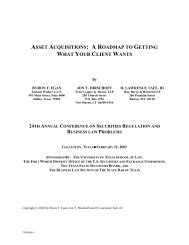fiduciary duty issues in m&a transactions - Jackson Walker LLP
fiduciary duty issues in m&a transactions - Jackson Walker LLP
fiduciary duty issues in m&a transactions - Jackson Walker LLP
Create successful ePaper yourself
Turn your PDF publications into a flip-book with our unique Google optimized e-Paper software.
The Delaware Code subjects directors and officers of Delaware corporations to personaljurisdiction <strong>in</strong> the Delaware Court of Chancery over claims for violation of a <strong>duty</strong> <strong>in</strong> theircapacities as directors or officers of Delaware corporations. 20 Texas does not have a comparablestatute.20merger <strong>in</strong> which the preferred stock was converted <strong>in</strong>to cash but the corporation survived); see also Matulich v. AegisCommunications Group, Inc., 942 A.2d 596 (Del. 2008) (where certificate of designation of preferred stock providedthat holders of the preferred stock had no vot<strong>in</strong>g rights but had the right of approval and consent prior to any merger,the holders of the preferred stock did not have any statutory right to vote on a merger, but had only a dist<strong>in</strong>guishablecontractual right to approve of and consent to mergers; thus s<strong>in</strong>ce pla<strong>in</strong>tiff’s preferred stock was not entitled to vote onthe merger, the holder of over 90% of the stock entitled to vote on the merger could approve a short form merger underDGCL § 253 and does not have to establish the entire fairness of the merger). In contrast, <strong>in</strong> Elliott Assocs. v. AvatexCorp., 715 A.2d 843 (Del. 1998), the certificate of <strong>in</strong>corporation provision expressly gave preferred stockholders aclass vote on the “amendment, alteration or repeal, whether by merger, consolidation or otherwise” of provisions of thecertificate of <strong>in</strong>corporation so as to adversely affect the rights of the preferred stock, and preferred stock was converted<strong>in</strong>to common stock of the surviv<strong>in</strong>g corporation of a merger. The Court <strong>in</strong> Elliott, for purposes of its op<strong>in</strong>ion, assumedthat the preferred stock was adversely affected, dist<strong>in</strong>guished Warner because the charter conta<strong>in</strong>ed the “whether bymerger, consolidation or otherwise” language, and held that the preferred stock had a right to a class vote on the mergerbecause the adverse effect was caused by the repeal of the charter and the stock conversion. The Court <strong>in</strong> Elliottcommented that the “path for future drafters to follow <strong>in</strong> articulat<strong>in</strong>g class vote provisions is clear”: “When acertificate (like the Warner certificate or the Series A provisions here) grants only the right to vote on an amendment,alteration or repeal, the preferred have no class vote <strong>in</strong> a merger. When a certificate (like the First Series Preferredcertificate here) adds the terms ‘whether by merger, consolidation or otherwise’ and a merger results <strong>in</strong> an amendment,alteration or repeal that causes an adverse effect on the preferred, there would be a class vote.” Id. at 855. SeeBenchmark Capital Partners IV, L.P. v. Vague, 2002 Del. Ch. LEXIS 90, at *25 (Del. Ch. July 15, 2002) (“[A court’sfunction <strong>in</strong> ascerta<strong>in</strong><strong>in</strong>g the rights of preferred stockholders] is essentially one of contract <strong>in</strong>terpretation.”), aff’d subnom. Benchmark Capital Partners IV, L.P. v. Juniper F<strong>in</strong>. Corp., 822 A.2d 396 (Del. 2003); and Watchmark Corp. v.Argo Global Capital, LLC, et al, C.A. 711-N (Del. Ch. November 4, 2004). (“Duties owed to preferred stockholdersare ‘primarily . . . contractual <strong>in</strong> nature,’ <strong>in</strong>volv<strong>in</strong>g the ‘rights and obligations created contractually by the certificate ofdesignation.’ If <strong>fiduciary</strong> duties are owed to preferred stockholders, it is only <strong>in</strong> limited circumstances. Whether agiven claim asserted by preferred stockholders is governed by contractual or <strong>fiduciary</strong> <strong>duty</strong> pr<strong>in</strong>ciples, then, depends onwhether the dispute arises from rights and obligations created by contract or from ‘a right or obligation that is not byvirtue of a preference but is shared equally with the common.’”)Under Texas law and unless the charter otherwise provides, approval of a merger or other fundamental bus<strong>in</strong>esstransaction requires the affirmative vote of the holders of two-thirds of (i) all of the corporation’s outstand<strong>in</strong>g sharesentitled to vote vot<strong>in</strong>g as a s<strong>in</strong>gle class and (ii) each class entitled to vote as a class or series thereon. TBOC § 21.457;TBCA art. 5.03.F. Separate vot<strong>in</strong>g by a class or series of shares of a corporation is required by TBOC § 21.458 andTBCA art. 5.03.E for approval of a plan of merger only if (a) the charter so provides or (b) the plan of merger conta<strong>in</strong>sa provision that if conta<strong>in</strong>ed <strong>in</strong> an amendment to the charter would require approval by that class or series under TBOC§ 21.364 or TBCA art. 4.03, which generally require class vot<strong>in</strong>g on amendments to the charter which change thedesignations, preferences, limitations or relative rights or a class or series or otherwise affect the class or series <strong>in</strong>specified respects. Unless a corporation’s charter provides otherwise, the forego<strong>in</strong>g Texas merger approvalrequirements (but not the charter amendment requirements) are subject to exceptions for (a) mergers <strong>in</strong> which thecorporation will be the sole survivor and the ownership and vot<strong>in</strong>g rights of the shareholders are not substantiallyimpaired (TBOC § 21.459(a); TBCA art. 5.03.G), (b) mergers affected to create a hold<strong>in</strong>g company (TBOC §§ 10.005,21.459(b); TBCA art. 5.03.H – 5.03.K), and (c) short form mergers (TBOC §§ 10.006, 21.459(b); TBCA art. 5.16.A –5.16.F).The California courts, however, tend to uphold California statutes aga<strong>in</strong>st <strong>in</strong>ternal affairs doctr<strong>in</strong>e challenges. SeeFriese v. Superior Court of San Diego County, 36 Cal. Rptr. 3d 558 (Cal. Ct. App. 2005), <strong>in</strong> which a California courtallowed <strong>in</strong>sider trad<strong>in</strong>g claims to be brought aga<strong>in</strong>st a director of a California based Delaware corporation and wrote“while we agree that the duties officers and directors owe a corporation are <strong>in</strong> the first <strong>in</strong>stance def<strong>in</strong>ed by the law ofthe state of <strong>in</strong>corporation, such duties are not the subject of California’s corporate securities laws <strong>in</strong> general or[Corporate Securities Law] section 25502.5 <strong>in</strong> particular…. Because a substantial portion of California’s marketplace<strong>in</strong>cludes <strong>transactions</strong> <strong>in</strong>volv<strong>in</strong>g securities issued by foreign corporations, the corporate securities laws have beenconsistently applied to such <strong>transactions</strong>.”10 Del. C. § 3114(a) and (b) provide (emphasis added):(a) Every nonresident of this State who after September 1, 1977, accepts election or appo<strong>in</strong>tment asa director, trustee or member of the govern<strong>in</strong>g body of a corporation organized under the laws of this5446095v.16
















